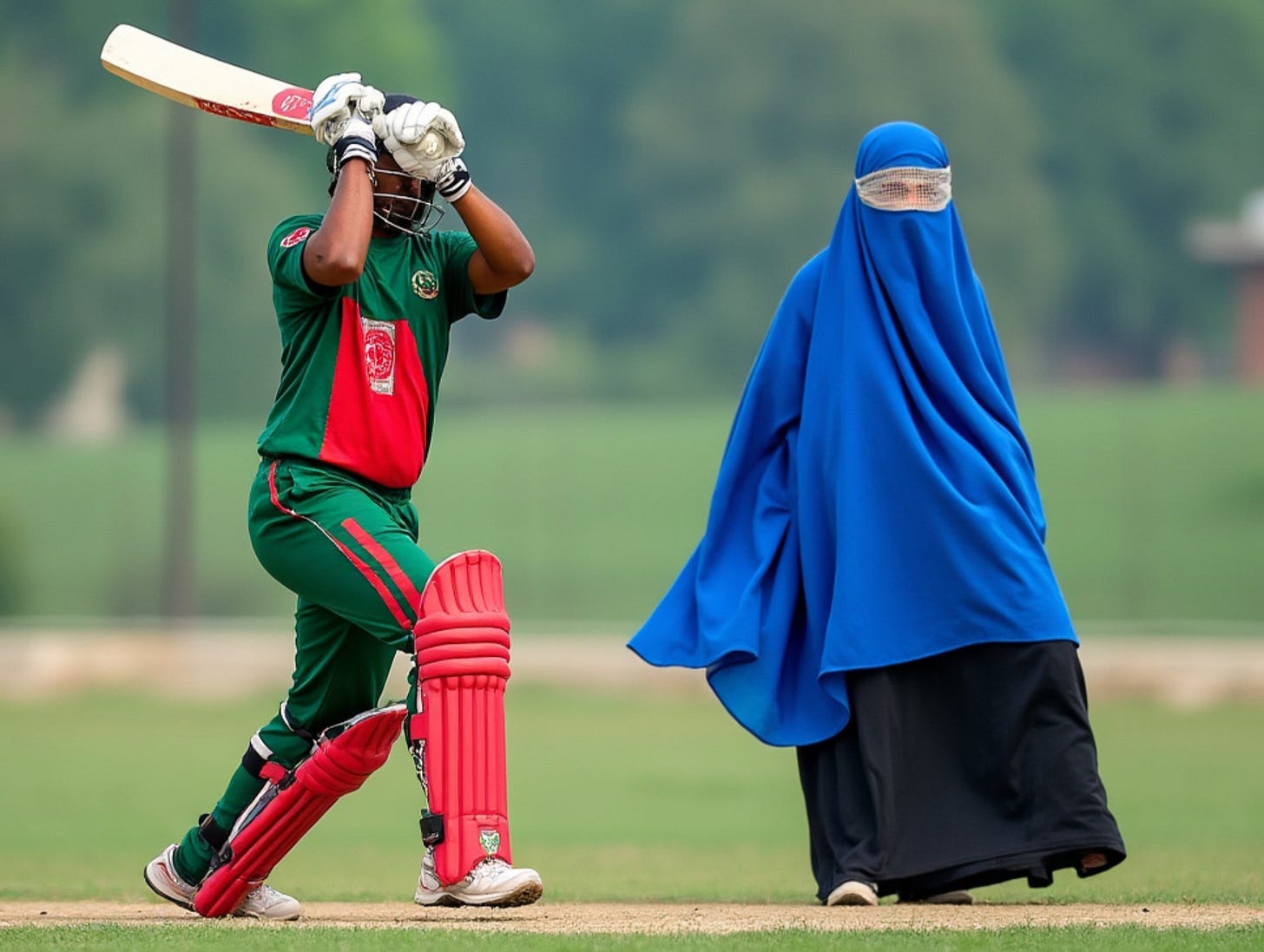Enslaving Women is 'Just Not Cricket'
The Taliban's Free Pass from the International Cricket Council (ICC)
Disclaimer: I would like to apologise in advance if some readers find this article a little 'niche'. However, I can assure you that it is both relevant and important. This is because it touches directly on Islamic doctrine on the treatment of women and how it is applied by the Taliban in Afghanistan.
Earlier this week, Afghanistan beat England in the ICC Champions Trophy. This seems like a run-of-the-mill headline. However, the question needs to be asked whether a match like this should even take place?
It is quite possible that many readers, particularly those based in North America, do not know much about cricket. It's a shame, really, because cricket is a wonderful game and is the second-largest sport in the world based on participation and the size of its global audience.
On the other hand, most of my readers will know about Afghanistan and its appalling treatment of women based on its interpretation of Islamic teachings. So what is the connection? Well, cricket is by far the most popular sport in Afghanistan, and I believe it represents one of the few remaining levers to pull in terms of exerting pressure on the Taliban regime.
In 2023 alone, Afghanistan's cricket team played 34 international matches across all formats, including One-Day Internationals, T20s, and Test matches. This highlights the significance of cricket in Afghanistan’s global sporting presence. A ban on Afghan participation in international cricket matches would deprive the Taliban of a source of legitimacy and send the message that the rest of the world is concerned with what is happening there.
There are, of course, many historical and current examples of sporting boycotts. South Africa was banned from international sporting participation for most of the 1980s, and as we speak, Russian teams are not welcome at the Olympics and many major sporting events. Other historical examples include the boycott of Yugoslav teams during the Balkan wars of the 1990s and the exclusion of Iranian athletes from certain events due to geopolitical tensions. There are ongoing debates about the effectiveness of such boycotts, but it must surely be the case that the absence of international competition is keenly felt in some sectors of the population of affected countries.
I believe we can agree that when boycotts are contemplated and applied, it should be done with an even hand. However, this is not at all the case when it comes to the presence of Afghanistan in the international cricketing arena.
Afghanistan remains a full member of the International Cricket Council (ICC), allowing it to participate in international matches in all formats of the game. This is remarkable, particularly when we consider the Taliban’s ban on women and girls playing sports, including cricket.
When it comes to its official requirements for membership, the ICC, in paragraph 2.4 of its Articles of Association, bans any form of government interference in national cricket associations. The Afghanistan Cricket Board should be able to manage its affairs without any input from the government. This is obviously not the case. The same document includes section 2.1 of the ICC’s regulations, which states that full members should have a "sustained and sufficient pool of players to support strong and consistent national, stable selection across the senior men's, under-19, and women’s teams." Furthermore, Clause 2.1(a)(i) specifies that members must have “a commitment to the development of cricket, including a clear plan for the promotion of women's cricket at all levels.”
Obviously, Afghanistan spectacularly fails to meet these criteria. The Taliban officially banned women from participating in sports. This is not a stance that they are willing to compromise on. In 2021, a spokesman for the Taliban’s Cultural Commission stated that female involvement in sport, including cricket, was "neither appropriate nor necessary." In one of its own reports, the ICC confirms the impact of this ban, stating that ‘no female cricket activity is taking place in Afghanistan’.
The case that Afghanistan is in blatant violation of the ICC's requirements for membership is open and shut. In spite of this, the ICC has not taken any action against Afghanistan. It is not as though the ICC lacks a track record of suspensions. It suspended Zimbabwe in 2019 and Sri Lanka in 2023 when it deemed there was political interference with local cricket boards. These suspensions were eventually lifted, but it is striking to see how the ICC’s willingness to act in these cases of supposed political meddling is in very stark contrast to its response to Afghanistan. Here, interference is arguably far more severe due to the fact that it completely prevents women's participation in sport.
I believe that what we see here is just another case of the double standard that is applied whenever Islam is concerned. Because the Taliban's position is religiously motivated (i.e., by the teachings of Islam), the ICC seems willing to throw the women of Afghanistan under the bus. This is precisely the attitude that is sometimes described as ‘Islam's Free Pass'. An attitude that should be called out and challenged wherever we see it. Thankfully some other cricketing nations are beginning to exert unlilateral pressure, by refusing to play Afghanistan. One can only hope that the ICC will also eventually find its backbone.
For more about some of the troubling aspects about the teachings of Islam, please see my book ‘Questioning Islam - Tough Questions and Honest Answers About the Muslim Religion’.
Kind regards,
Peter
Peter
If you received this post via email, please forward it to your friends who might be interested. Otherwise, use the button below to share it on social media.
Please use the button below to subscribe, or to support my work by upgrading to a paid subscription.




